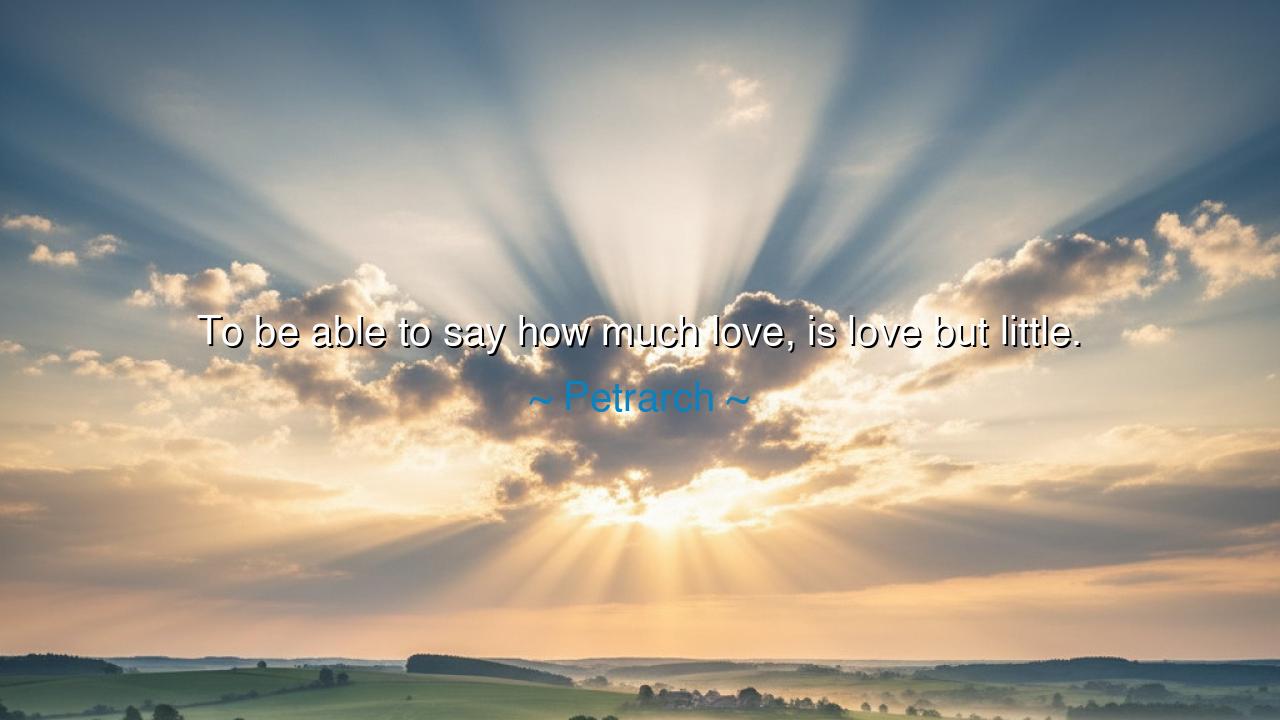
To be able to say how much love, is love but little.






"To be able to say how much love, is love but little." These words by the great poet Petrarch speak to the profound depth of love and the limitations of human expression in conveying the fullness of this emotion. Love, in its truest form, is something that cannot be fully captured by words. To quantify it or express it in simple terms is to diminish its true essence. When we say we love, or when we attempt to define how much love we feel, we are only scratching the surface. Love is not something that can be measured or described in its entirety, for it is as vast as the sea and as boundless as the sky. To attempt to express it in mere language is to limit its infinite nature.
The ancients often saw love as a force that transcended the boundaries of human understanding. Plato, in his Symposium, described eros, the god of love, as a divine force that leads the soul from earthly desires to the pursuit of beauty and truth. Plato believed that love was not simply a physical attraction, but a spiritual journey, one that connects the lover to something far greater than themselves. Love, in this sense, could not be captured by mere words or simple expressions. Eros was a force that could only be truly understood by experiencing its transformative power. Just as Petrarch suggests, love’s depths are beyond the grasp of language, and any attempt to measure it with words falls short of its true power.
In Roman mythology, the love between Venus and Mars offers another example of love’s mysterious and untamable nature. Venus, the goddess of love, was known to inspire both intense beauty and passion, while Mars, the god of war, embodied strength and desire. Their relationship was passionate and tumultuous, much like the force of love itself. In their love, as in all true love, there was a sense of imbalance — the kind of love that goes beyond words, beyond reason, and is driven by something deeper, something that cannot be measured. The very passion of their love transcended the idea of simple romantic affection, becoming a force that altered the very fabric of their existence. Like Petrarch’s words, their love could not be explained, only experienced, and in that experience, it became something far greater than the sum of its parts.
Shakespeare too explored the elusive nature of love in his plays, particularly in Romeo and Juliet. The love between the two young lovers is intense and all-consuming, yet it is also marked by the fact that their love, though boundless, is doomed by circumstance. Their love is described as a “rose by any other name,” suggesting that love cannot be fully contained by labels or definitions. It is an overwhelming force that sweeps them up, and in their brief, passionate union, they discover the profound truth that love, in its purest form, is not something that can be expressed in words or confined by time. Love’s true essence, as Petrarch says, is not in the saying, but in the feeling, the experience, and the sacrifice that it requires.
In modern life, we still struggle to fully capture the nature of love. We say "I love you" to friends, partners, and family, but how often do we truly comprehend the depth of these words? Words, by their very nature, are limiting. They are meant to express something specific, something concrete. But love is neither specific nor concrete. It is a force that can be felt in a glance, in a moment of silence, in a shared laugh or a shared tear. The language of love often falls short because love itself is not a thing that can be neatly packed into sentences. It is a feeling that ebbs and flows, that can grow and contract, and that can never be truly captured by mere words.
Petrarch’s words serve as a reminder to us all that love is not something to be measured or analyzed. It is a force to be felt, lived, and experienced, not explained. To say how much we love is to do a disservice to the vastness of the emotion. True love is not something that can be contained within the boundaries of language, nor should it be. The deepest forms of love — the ones that transcend time and space — are those that are not bound by limits or definitions. Love is not to be quantified but embraced, in its entirety, for the entirety of its mystery and beauty.
The lesson we can draw from Petrarch’s words is that we must stop seeking to define love with words or expectations. Love, in its purest form, is an experience, a feeling, and a connection that goes beyond what we can express. Live love fully, not by trying to measure or analyze it, but by experiencing it in all its complexity. Allow love to transform you without the need to explain it, knowing that the essence of love is not in how much we say, but in how deeply we feel. The next time you find yourself in the presence of love, embrace it fully, without the need to quantify or qualify it. Let love be the force that shapes your life, and let its boundless nature free you from the need to put it into words. Experience love, and in that experience, find the freedom it offers.






AAdministratorAdministrator
Welcome, honored guests. Please leave a comment, we will respond soon